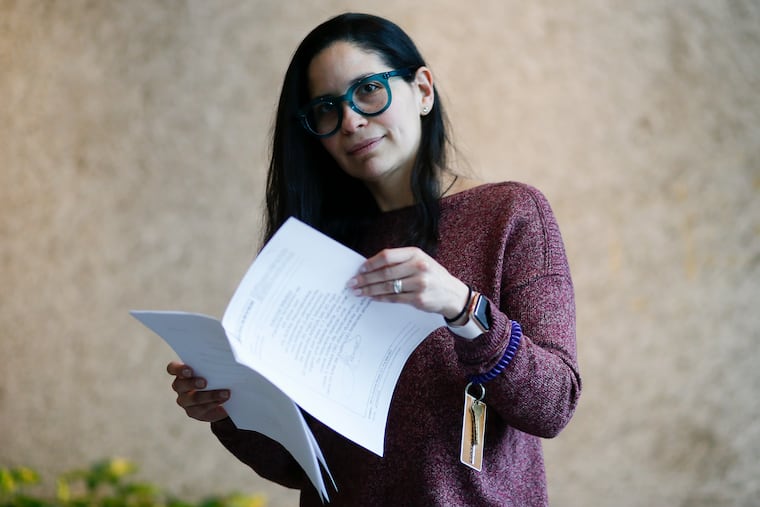‘When your heart and mind are divided’: Philly residents are lifelines for relatives in Venezuela
The current social and political instability has a worse financial impact for those who recently migrated from Venezuela, as they find themselves displaced from their professional lives now working minimum-wage jobs and sending money home.

Irene Contreras is so used to the rigmarole involved in getting medicine to her parents in Venezuela that she seems almost resigned — at least compared with how she felt when she started, when the dire situation would bring her to tears.
“I was in denial,” she said. “I was furious because it’s not fair.”
The month-long process always starts in Venezuela with primary care doctors writing and translating to English an extended prescription for each parent, which must get signed and sealed there by both doctor and notary. Her 67-year-old mother ships the documents to Contreras in Philadelphia, where she makes copies and mails the originals to a Canadian pharmacy, pays electronically for her mom’s arthritis pills ($99) and dad’s hypertension medication ($60), and waits 15 days for its return here.
Contreras prepares a package of goods — what she and her family have named “the hope boxes” — that she mails for $80 to a courier in Miami, who takes it to Caracas, the capital.
Luckily, her parents can grow mangoes and plantains behind their house, but to shop for any other food, they would need to wait in a two-hour line just to get gas so they could travel to the nearest town. So, also packed in the 30-pound box is everything from rice and beans to soap, toothpaste, Band-Aids, gauze and alcohol.
“The situation is that Venezuelans who don’t work to help their families know that no one will eat or live in Venezuela,” said Contreras, 37, a translator at a law firm, who came to the United States in 2014 with her husband and are now permanent residents.
<< To read this story in Spanish, click here.
In a once-prosperous country where a crisis of political power has translated to skyrocketing consumer prices, food shortages, and a collapse of the public health system, Venezuelans “en el exterior” see themselves as responsible for keeping their loved ones alive.
And José Benavides, vice president for the nonprofit Casa de Venezuela — which supports about 11,000 Venezuelans in the Philadelphia area — said the current social and political instability has a worse financial impact for those who recently migrated from Venezuela, as they find themselves displaced from their professional lives, now working minimum-wage jobs and sending home $200 to $300 a month to their families. About 3.7 million Venezuelans have left the South American country in the last five years, according to the United Nations.
“It’s a strong emotional and psychological burden, too, when your heart and mind are divided between the responsibilities you have here and the escalating situations that affect our people in Venezuela,” Benavides said.
For Alexander Moreno, 42, who moved to Kingsessing seven months ago with his wife, Harianned Chaurel, 35, it’s been difficult to manage the reality overseas. Moreno, an electronic engineer who owned a business in Venezuela, now works as a cleaning aide in Center City. Chaurel, a former journalist, works at a local restaurant. The couple fled the country two years ago when Chaurel received death threats because of her work. They now have asylum here.
“We used to talk about traveling together," Chaurel said, "and all of the sudden we had to run away.”
In Philadelphia, Chaurel works to support her parents, two aunts, a sister, and three nieces. Moreno sends money to his father, 73, whose monthly salary would basically buy a pound of cheese.
Yet, because it’s more feasible to use dollars there than bolívares — the exchange rate is about $1 to 5,100 bolívares — Moreno has to ask one of his relatives in Venezuela to walk across the Andes mountains, rife with gun violence, to Colombia to find the nearest Western Union office, and then go back the same way. Or, Moreno needs to find a "service provider” in Venezuela with a U.S. bank account.
“We learn about the trustworthy ones on WhatsApp and the Venezuelan Facebook groups in each city," Moreno said. “Some even promote themselves on Instagram. And charge from 10 percent to 15 percent for the transaction.”
Moreno said one-quarter of their weekly income is dedicated to their relatives in Venezuela, leaving the couple with $400 to $650 a week to pay for rent, transportation, food and utilities. Nothing is left for savings. Moreno hopes that Venezuelans around the world can “get back to order," allowing them to work and live in dignified ways.
“We hope that at some point we can overcome this survival mode," he said, "and become a nation that can live in peace.”